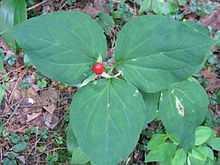Trillium erectum
| Trillium erectum | |
|---|---|
 | |
| Conservation status | |
| Scientific classification | |
| Kingdom: | Plantae |
| (unranked): | Angiosperms |
| (unranked): | Monocots |
| Order: | Liliales |
| Family: | Melanthiaceae |
| Genus: | Trillium |
| Species: | T. erectum |
| Binomial name | |
| Trillium erectum L. | |
Trillium erectum, also known as wake-robin, red trillium, purple trillium,[2] Beth root, or stinking Benjamin,[3] is a species of flowering plant native to the east and north-east of North America. It is a Spring ephemeral, an herbaceous perennial whose life-cycle is synchronised with that of the deciduous forests where it lives.

This plant grows to about 40 cm (16 in) in height with a spread of 30 cm (12 in), and can tolerate extreme cold in winter, surviving temperatures down to −35 °C (−31 °F). Like all trilliums, its parts are in groups of three, with 3-petalled flowers above whorls of pointed triple leaves.[4] The leaves contain calcium oxalate crystals and crystal raphide, and should not be consumed by humans. The flowers are a deep red colour, though there is a white form. The flowers have the smell of rotting meat, as they are pollinated by flies.
The plant takes its name "wake-robin" by analogy with the Robin, which has a red breast heralding spring.
This plant has gained the Royal Horticultural Society's Award of Garden Merit.[5]
References
- ↑ "Trillium erectum". NatureServe Explorer. NatureServe. Retrieved 2008-05-02.
- ↑ Dickinson, T.; Metsger, D.; Bull, J.; & Dickinson, R. (2004) ROM Field Guide to Wildflowers of Ontario. Toronto:Royal Ontario Museum, p. 79.
- ↑ Stinking Benjamin: A trillium that by any other name would smell so sweet, adirondack almanack
- ↑ RHS A-Z encyclopedia of garden plants. United Kingdom: Dorling Kindersley. 2008. p. 1136. ISBN 1405332964.
- ↑ "RHS Plant Selector - Trillium erectum". Retrieved 7 June 2013.
External links
| Wikimedia Commons has media related to Trillium erectum. |
 Trillium erectum |
 Fruit of purple trillium |
| ||||||
